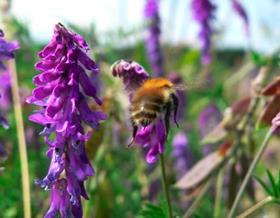
The NFU has said it “deeply regrets” the news that Defra will reverse its previous stance and back further restrictions on neonicotinoid pesticides.
Defra minister Michael Gove made the announcement last week after stating that the risks to bees and pollinators from neonics were greater than previously understood. The UK will now support the European Commission's proposal to ban the use of neonicotinoid seed treatments in non-flowering crops.
The news has been met with disappointment by the farming union, which has previously lobbied in favour of neonics, while agro chemical giant Bayer slammed it as a “bizarre decision”.
“We deeply regret the decision the government has taken on this issue as we don’t believe the evidence justifies this abrupt change in policy,” said Chris Hartfield, NFU acting chief science and regulatory affairs adviser.
“We will continue to speak to the government about how the impact of the decision can best be mitigated so that farmers can maintain sustainable and productive cropping systems.”
Julian Little, a spokesperson for Bayer in the UK, said: 'This is a bizarre decision and one that flies in the face of sound science.
'We do know from talking to farmers that such a ban would seriously impact the UK's ability to grow high quality wheat, barley, sugar beet and some vegetable crops, just as UK farmers are trying to gear up to life after European subsidies.'
“Farmers will have to resort to older chemical sprays to control damaging insect pests rather than the targeted seed treatments currently employed,” Little added.
Gove said he made his decision following a new report by the government’s advisory body on pesticides, which said scientific evidence now suggests the environmental risks posed by neonics support the case for further restrictions.



